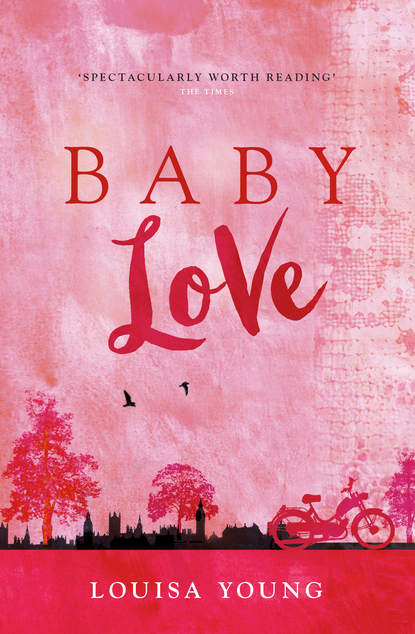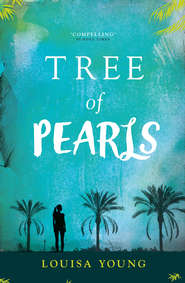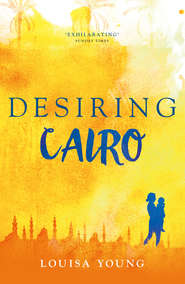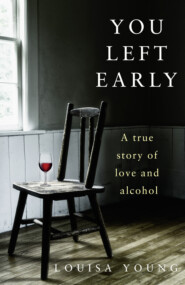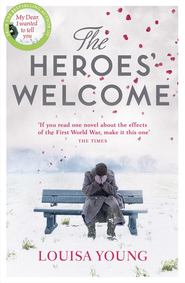По всем вопросам обращайтесь на: info@litportal.ru
(©) 2003-2024.
✖
Baby Love
Автор
Год написания книги
2019
Настройки чтения
Размер шрифта
Высота строк
Поля
Chapter Eleven: Learning
Chapter Twelve: Flowers from Eddie
Chapter Thirteen: Janie’s Tea-chest
Chapter Fourteen: Unsettling
Chapter Fifteen: Eddie Again
Chapter Sixteen: Out
Chapter Seventeen: Showtime
Acknowledgements
About the Author
Also by Louisa Young
About the Publisher
Introduction (#ub48330bd-c5fd-5b1d-97fe-5ea89185924b)
I wrote these novels a long time ago. I spent my days correcting the grammar at the Sunday Times, and my nights writing. I could no longer travel the world doing features about born-again Christian bike gangs in New Jersey, or women salt-miners in Gujarat, or the Mr and Mrs Perfect Couple of America Pageant in Galveston, Texas, which was the sort of thing I had been doing up until then. I had to stay still. I had a baby. Babies focus the mind admirably: any speck of time free has to be made the most of.
I had £300 saved up, so I put the baby and the manuscript in the back of a small car and drove to Italy, where we lived in some rooms attached to a tiny church in a village which was largely abandoned, other than for some horses and some aristocrats. A nice girl groom took the baby to the sea each day in my car while I stared at the pages thinking: ‘If I don’t demonstrate some belief in this whole notion of novels, and me as a novelist, then why should anyone else?’
Re-reading these books now, I think, ‘Christ! Such energy!’ I was so young – so full of beans. I described the plot to my father, who wrote novels and was briefly, in his day, the new Virginia Woolf. After about five minutes he said, ‘Yes, that all sounds good’ – and I said, ‘Dad, that’s just chapter one’.
It was only about twenty years ago, and a different world. Answerphones not mobiles, no internet. Tickets and conductors on the bus. And it was before 9/11, and the mass collapse of international innocence which 9/11 and George Bush’s reaction to it dragged in their miserable, brutalising wake. Could I write a story now, where an English girl and her Egyptian lover meet at the surface of the water? Yes, of course – but it could not be this story.
Anyway, I have grown up too thoughtful to write like this now. I exhaust myself even reading it.
I see too that these, my first novels, were the first pressing of thoughts and obsessions which have cropped up again and again in things I’ve written since. It seems I only really care about love and death and surgery and history and motorbikes and music and damage and babies, and the man I was in love with most of my life, who has appeared in various guises in every book I have ever written. I realise I continue to plagiarise myself all the time, emotionally and subject-wise. And I see the roots of other patterns – Baby Love, my first novel, turned into a trilogy all of its own accord. Since then, I’ve written another two novels that accidentally turned into trilogies – and one of those trilogies is showing signs of becoming a quartet.
People ask, oh, are they autobiographical? I do see, in these pages, my old friends when we were younger, their jokes and habits, places I used to live, lives I used to live. I glimpse, with a slight shock, garments I owned, a bed, a phrase … To be honest I made myself cry once or twice.
But, though much is undigested and autobiographical, in the way of a young person’s writing, I can say this: be careful what you write. When I started these novels I was not a single mother, I didn’t live in Shepherds Bush, I didn’t have a bad leg and I wasn’t going out with a policeman. By the time they were finished, all these things had come about. However as god is my witness to this day I never have never belly danced, nor hit anyone over the head with a poker.
Louisa Young
London 2015
ONE (#ub48330bd-c5fd-5b1d-97fe-5ea89185924b)
An Argument (#ub48330bd-c5fd-5b1d-97fe-5ea89185924b)
I had had one hell of an evening one way or another. I didn’t want to see the guy in the first place, but when you’ve known someone twelve years it’s never quite the right time to tell them to go away, specially when you owe them, and I owed him. Well, let that be a lesson to me.
Neil likes me more than I like him. Neil used to ring up and say, ‘When can I see you? Tonight tomorrow Wednesday Thursday Friday Saturday Sunday or any day next week? Or the week after?’ I liked Neil too – still do – he’s funny and kind, a clever lawyer, probably too good for me anyway. But I’m not the kind of woman who gets a kick out of a good man trailing his unrequited love around in front of her like Raleigh’s muddy cloak. So I tell him, and then he starts saying, ‘No, look, it’s fine, really, it’s not the same as it was, look, I can accept it. Really.’
And I say OK, because I’m not so vain as to believe a man’s in love with me when he’s saying he’s not any more. And then two weeks later something comes up and there is occasion to say, ‘But you said you weren’t in love with me any more!’ and he turns and says, ‘Don’t ever believe me if I say that.’
So that was Wednesday evening. My friend Brigid, who is a star, and the sort of woman I’d really like to be if things – including me – were different, came round to babysit and I thought Neil and I might go to the pictures. That way we could avoid being pissed off at each other over a dinner table all evening. He wasn’t having it. He’d booked a table. He was going to insist on paying, too, and he was going to get his money’s worth of making me feel bad because he felt bad because I didn’t like him as much as he liked me.
So we ended up in one of those unpleasantly modern Italian restaurants in Soho, in which plate glass and cackling pretentious drunkards have replaced all the perfectly nice straw-wrapped Chianti bottles and Sicilian donkeys hanging from the ceilings which used to be there in the old days. I picked at my over-cooked tagliatelle and drank too much over-priced Soave, and he bitched at me.
Neil doesn’t drink. I do. We’d fallen into this habit over the years where after a night out he’d drive me home in my car – or on my bike in the old days – and then get a minicab from round the corner. He never asked to come in except sometimes in the old days when we were young and skint, when he’d sleep on the sofa and I’d resent his presence the next morning. He never tried to kiss me. It was a great relationship.
Anyway that night I lost my temper with him. We were at a red light on Shaftesbury Avenue and he said, ‘So are you free next week?’ It’s a ridiculous question. He knows I stay home with my kid anyway, but what gets me is that if I did spend all my time in nightclubs dancing the lambada with a camellia behind each ear and a handsome Argentinian in my arms it would be none of his damn business. And I said, ‘Neil, don’t interrogate me.’
He looked at me, and then he did something that he loves to do – he walked out. This is normally nothing more than irritating (or a relief) but at a red light just by Piccadilly Circus on a Friday night at closing time it was actively inconvenient. He stepped out of the car, slammed the door and walked off into the crowd.
‘For fuck sake!’ I yelled, and the lights changed, and the cars behind started honking. So I slid into the driver’s seat and took off.
I turned into the first side street I could. Rupert Street. Unfortunately it was one way. The other way. The policeman hanging around on the corner couldn’t believe his luck. I couldn’t believe mine either.
*
Getting done for drunken driving and driving the wrong way up a one-way street is not necessarily the end of the world but it was near as dammit for me.
After all the ritual humiliation – it really is a drag not being in the right – they let me out of the station at about three in the morning, but they wouldn’t give me my car keys. I made them unlock the car for me to take out a bottle of vodka I had on the back seat. It just confirmed their suspicions. I found a taxi – I think the driver knew what time they let the drunk drivers out and made it a regular pick-up point – and got home. They hadn’t let me ring home either so Brigid was lying in half-hysterical half-sleep on the sofa when I let myself in. I looked in on Lily. She was deep in the sleep of the ignorant, golden-pink and fragrant. I could hear her tiny breathing.
Brigid’s a lovely woman but she can shriek when she has a mind to.
‘Where’ve you been?’ she shrieked. Well, it was a fair question. I’d told her not a minute after midnight. Brigid is the nearest thing I’ve had in a long time to parents wanting me home on time. She has pale red hair and four children and every human quality except beauty. How does a woman with four children come to be babysitting? By a precious combination of every human quality and a gaggle of sisters, all in the neighbourhood, who fight among themselves for the privilege of babysitting their nephews and nieces, thus liberating Brigid to sit for me. It’s an unspoken thing among them. Brigid needs money, I need time, women need to help each other. It works. Brigid’s been babysitting for me and worrying about me ever since I got Lily, and I like her. Actually she’s a friend. And so are Maireadh and Siobhan and Eileen and Aisling.
‘Don’t shriek,’ I said. ‘Just don’t shriek or I’ll cry.’
‘Don’t cry!’ she shrieked. I looked at her and she must have understood my look because she went to the fridge.
‘I’ve got it here,’ I said, opening the bottle of vodka.
‘I was looking for the milk,’ she said. ‘I was going to make you a cup of tea.’ She got me a glass and an ice-cube anyway. ‘What happened?’ she said.
‘I’ve been in gaol,’ I said. She knew that was a joke so she laughed. Even as I let her laugh the repercussions were running through my brain. My threat to cry may prove not idle yet, I thought. But I don’t cry. And I didn’t need to cry, I needed to think.
Brigid was still saying, ‘So what happened?’ I told her, briefly. I didn’t think she’d pick up the ramifications and she didn’t. I told her to go home. ‘It’s all right,’ she said. ‘Maireadh’s there with the boys. She’s been arguing with Reuben so she’s staying.’
‘Where’s Eileen then?’
‘Still there. Maireadh’s on the settee … I’ll sit with you a while.’
It was an honourable thought, so I let her for five minutes or so, then I made her go.
I poured the vodka and stared out the window at the stripy petunias in the hanging basket across the way, glowing in the midsummer midnight half dark. Only about half the bulbs in the streetlamps on my estate are ever working at one time, but in summer along the dim dirty red-brick walkways there is always the gleam of petunias in a hanging basket.
*





